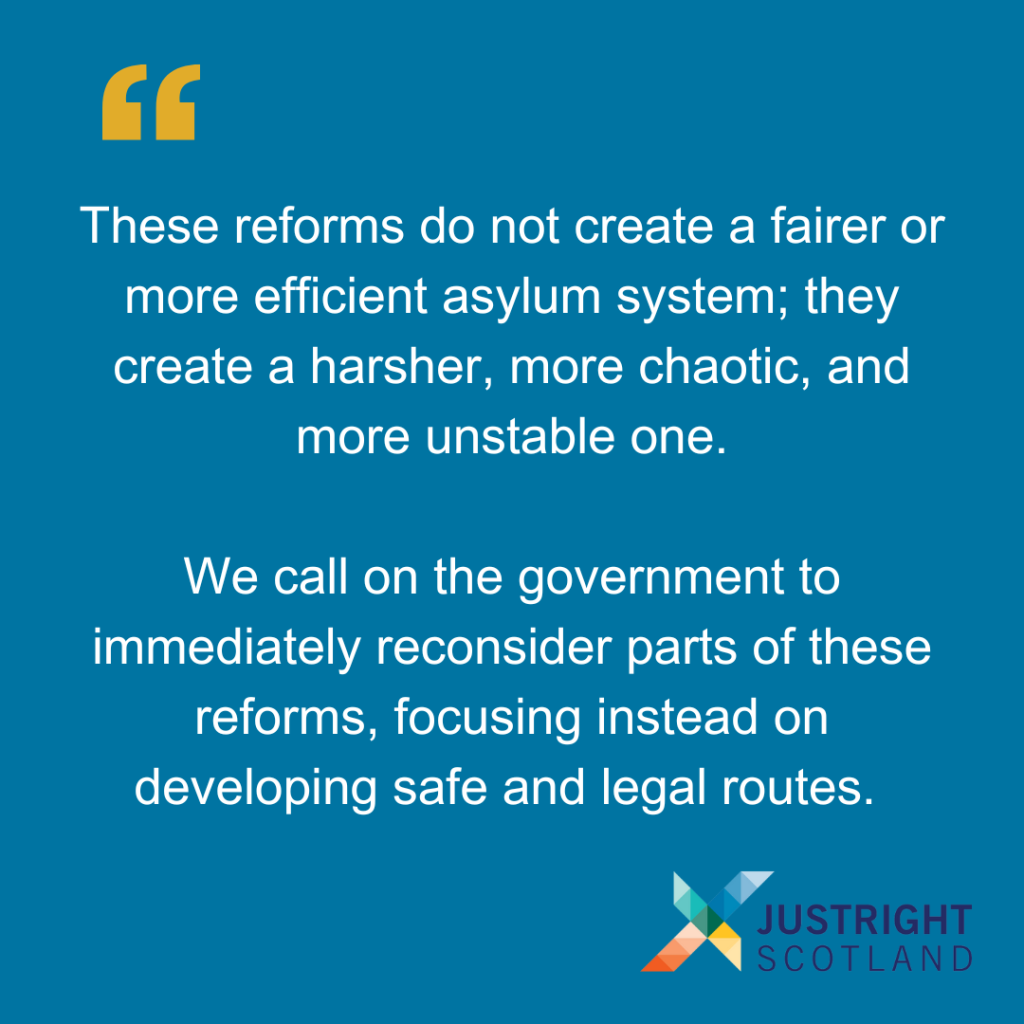
JustRight Scotland is deeply concerned about the UK Government’s proposed reforms, which prioritise punitive measures over protection, compassion, and fair process.
These proposals do not strengthen the asylum system; instead, they embed precarity, restrict access to justice, and risk normalising destitution for people seeking safety. If implemented, these changes will inflict severe harm on people who are already living in an unfair and unjust system and weaken the UK’s commitment to its international obligations.
For many years, we have worked alongside people navigating the UK asylum system, and we do not accept the narrative that the UK is a “soft touch.” That has never reflected the lived experiences of the people we support. The asylum process can be devastating – marked by prolonged delays, uncertainty, re-traumatisation, and severe social and economic hardships. In all our work, we have never encountered anyone who chose the UK because of the supposed “generosity” of refugee status. Yet this narrative continues to be deployed to justify reforms that dismantle protection rather than strengthen it.
Refugee status in the UK is already temporary, and the new proposals make it even more unstable. Under these reforms, people recognised as refugees will be required to renew their status every 30 months for up to 20 years before accessing settled status. Expecting people to rebuild their lives while living with this level of precarity is unrealistic and deeply harmful. It undermines recovery, integration, and the ability to contribute fully to society. It will also cost significant sums of public money. A system centred on repetitive renewal is neither efficient nor humane; it weakens us morally, socially, and economically.
In addition to prolonging uncertainty, the proposed Protection Work and Study visa route, presented as an expansion of opportunity, instead creates an unnecessary administrative burden on both refugees and taxpayers. Refugees are already entitled to work and study once recognised; layering a new visa regime onto existing rights offers no real benefit.
We are equally alarmed by the proposed restrictions on family reunion. We agree that family migration rules should be the same for refugees and British citizens. They are currently too onerous even for British citizens. By applying this standard to refugees, the UK Government is making family unity far too difficult for everyone. Restricting family reunion in this way heightens trauma, deepens instability, and erodes one of the very few safe and legal routes available for people seeking protection. It keeps families apart. We have been campaigning for years, calling for safe and legal routes, particularly for those fleeing crises such as Sudan and Gaza.
Beyond family reunion, other aspects of the reforms also exacerbate precarity. Making essential support discretionary for people who are destitute – while simultaneously banning them from working – is an extremely dangerous tool. If used, it will drive people into poverty, increase vulnerability to trafficking and exploitation, and place enormous pressure on local authorities already stretched to crisis point.
This proposed set of reforms can also be seen through the broader lens of an incoming assault on the ECHR (European Convention on Human Rights), with control on immigration as the justification.
The right to respect for family life is protected by Article 8 ECHR. It is an essential tool for solicitors seeking to reunite families torn apart by conflict. In our work, this looks like a young woman in the UK seeking reunification with her two child brothers displaced, alone, in East Africa. Or a British citizen who fled Sudan – the world’s deadliest current war – seeking reunification with his Sudanese wife.
We recognise that it is legitimate to prioritise removal for individuals whose claims have been properly assessed and refused, but this must be based on robust, lawful decision-making.
These reforms do not create a fairer or more efficient asylum system; they create a harsher, more chaotic, and more unstable one. They replace protection with punishment, legal certainty with prolonged insecurity, and rights with conditional privileges.
We call on the government to immediately reconsider parts of these reforms, focusing instead on developing safe and legal routes.





